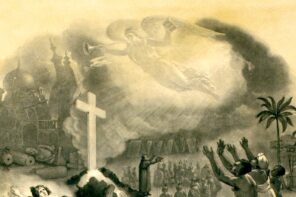After the Trump years and the January 6 insurrection, in which recognizably evangelical prayers and symbols featured prominently, America’s conservative, mostly white evangelical Christians aren’t exactly popular. But just when you think your expectations for this authoritarian demographic can’t get any lower, some “respectable” evangelical comes along and invokes the “biblical comma.” In case you were wondering, this ostensibly holy punctuation mark is just as much a real thing as dinosaurs on Noah’s Ark, although at least dinosaurs really did exist at one point in time, unlike commas in any ancient manuscript. Let me explain.
Over the weekend, Grace Bible Theological Seminary provost and theology professor Owen Strachan set Twitter abuzz with a profoundly ignorant tweet that reads, in part, “There is not a single edit you could make to Scripture to improve it. Anything you would do to amend so much as a biblical comma would drastically demote it. You can’t improve the Word of God. You’d only ruin perfection. Keep your edits on the shelf.”
Just so you know:
There is not a single edit you could make to Scripture to improve it.
Anything you would do to amend so much as a biblical comma would drastically demote it.
You can’t improve the Word of God. You’d only ruin perfection.
Keep your edits on the shelf.
— Owen Strachan (@ostrachan) July 18, 2021
The backlash was immediate and extensive. Of course, Strachan may have been trolling for exactly the sort of reaction he got, as he’s launching a book on Christianity and “wokeness,” which he’s described as “a major threat to the Christian faith” and “a different religion altogether.” But even so, some of the responses to Strachan, who later attempted to “clarify” his point, make for entertaining reading.”
Go beget yourself.
— A.R. Moxon (@JuliusGoat) July 19, 2021
Hey @ostrachan, where exactly are the Biblical commas, exactly? Having trouble finding them. https://t.co/x3xlIZl3kA pic.twitter.com/7rybFNrt98
— Rabbi Danya Ruttenberg (@TheRaDR) July 20, 2021
Good luck finding those “biblical commas.” They are even more elusive that “biblical womanhood.” https://t.co/WcWUpRAxXc
— Michelle Panchuk (@MichellePanchuk) July 20, 2021
But there is context here worth exploring that goes beyond a single puerile instance of “triggering the libs.” Apart from dunking on the “biblical comma,” a number of Twitter users, including RD contributor Andrew Seidel, pointed out that the Bible contains verses that legitimate the practice of slavery.
Can't make one edit to improve the bible?😂
How bout removing all the verses that are cool with OWNING ANOTHER HUMAN BEING—including the 2 implicit approvals of slavery in the 10 Commandments. It would not only be a better book, but a better moral guide.
What would you change? pic.twitter.com/zPxYcq05vD
— Andrew L. Seidel (@AndrewLSeidel) July 19, 2021
The funny thing in this regard is that Strachan, an occasional contributor to Tim Keller’s The Gospel Coalition and a classic Calvinist theobro, is known to prefer the ESV translation of the Bible, which replaces the term “slave” with the essentially made up euphemism “bondservant.” In other words, this fan of the “unedited” Bible is aware of modern edits and prefers certain ones over others.
But why would Strachan, who has an undergraduate degree from a secular liberal arts college and advanced degrees, including a PhD, from accredited seminaries, tweet something he clearly knows to be false? For help addressing that question, RD turned to scholars in religious studies with expertise on American evangelicalism.
University of North Florida Professor Julie Ingersoll noted that evangelical academics occupy an awkward space in which they must deliver anti-intellectual red meat to evangelical audiences even as they crave the respectability that comes with having credentials those outside their religious community generally will recognize as valid.
“They’ve always had this insecurity about legitimacy,” Ingersoll told RD. “It’s how we got evangelicalism out of fundamentalism. It’s why so many of them prefer to get their degrees from Oxford or somewhere in Scotland.”
Asked how Strachan could justify tweeting an outright lie about the Bible, Ingersoll mused, “In this case I might think that Strachan understood this not as lying but as hyperbole for marketing, to cause a fuss leading up to the launch of his book. But haven’t you ever heard evangelicals cite Rahab to justify lying to ‘the enemy?’”
Other religious studies scholars weighed in with related insights on Twitter:
The idea that you get credentialed while not changing your mind is a mark of your true faithfulness for a lot of fundamentalists. It's another case of "I told my professors what they wanted to hear, not what we know is the truth."
— David Feltmate (@DavidFeltmate) July 19, 2021
Yes, that's very real. Also, a "good education" can simply equip you to better defend what you already "know to be true" . . . so, for white evangelicals +education doesn't equal +tolerance in many statistical studies. And clearly +education doesn't lead to being "educated"
— Dr. Penny Edgell (@PennyEMN) July 19, 2021
My guess is willful ignorance. He knows better, but this sounds like what his audience wants to hear.
— Dr. Nancy Ammerman (@ntammerman) July 19, 2021
Bradley Onishi, a popular exvangelical podcaster and associate professor of religious studies at Skidmore College, approached the question from a somewhat different angle. “Strachan’s comments on ‘biblical commas’ are easily debunked. There is no historical case for them,” Onishi began, adding, “The deeper question is what such rhetoric does for him and other biblical literalists.” Noting that Strachan is a staunch advocate of the misogynistic doctrine of “complementarianism,” which holds that God created men and women for different roles and that it’s not permissible for women to hold authority over men, Onishi told RD:
Strachan is clearly someone who wants to control borders and bodies. His theology of gender, marriage, and family is based on a strict patriarchal order. His new book resists any examination of the American social body’s structuring, labeling ‘Whiteness’ an imaginary category. Read in this context, the ‘biblical comma’ tweets reflect a desire to put clear borders and boundaries around the biblical text, just as he has sought to do with marriage, family, and the nation. For him, the Bible is scary if it offers permeable categories and ambiguity.
Of course, reality is full of permeable categories and ambiguity, and authoritarian movements—whether religious, overtly political, or, as is frequently the case, both—are driven to keep that complexity at bay. What Onishi calls Strachan’s “theology of fear” is a powerful weapon in the Christian Right’s battle to uphold white supremacist patriarchy and social domination in the face of declining numbers. America currently faces a very real threat of minority authoritarian rule by white right-wing Christians like Strachan. And when it comes to fear, if we have any hope of staving off that threat, we need our media gatekeepers and elite pundits to stop being afraid to criticize their kind of Christianity.





